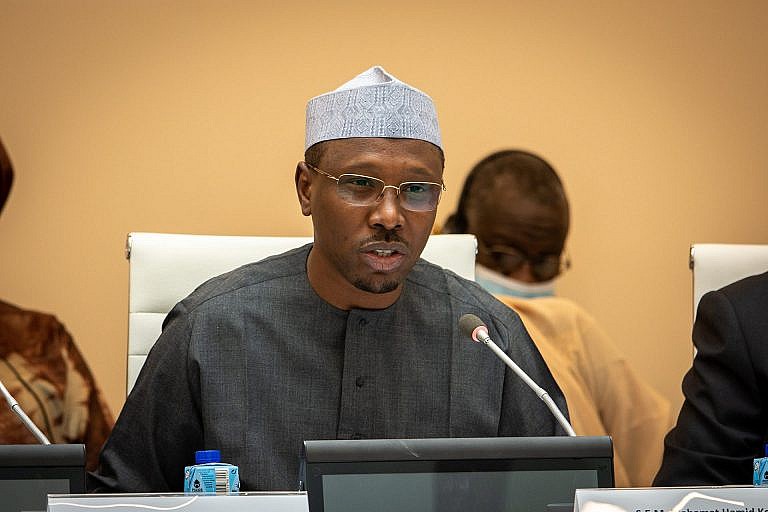“The real potential of the Sahel is its youth”

An interview with Mahamat Hamid Koua, current Chair of the G5 Sahel Council of Ministers, Chadian Minister of Economy, Development Planning and International Cooperation
What are your expectations as Lead Minister responsible for the G5 Sahel regarding the General Assembly of the Sahel Alliance, and the orientations that may emerge from it?
It is important to consider the international context and its upheavals. In this new context of world restructuring, marked by the war between Russia and Ukraine, a war of which the full consequences for Africa and for the people of the Sahel are not yet fully understood, I would like to recall the Coalition’s general principles, which are, among others, mobilisation and solidarity with the Sahel. I am pleased with the international mobilisation around the issues of the Sahel Alliance, which is maintained at the highest level with the new priorities and contexts. I am delighted that three new partners have joined the Sahel Alliance: the United States, Canada and Sweden. I believe that these accessions reflect a sense of solidarity and mobilisation for the entire Sahel region.
In your view, what are the prospects for short- and medium-term partnership with Sahel Alliance members on development issues?
I would like to see a closer linkage, or even a greater coordination, of all the efforts of both our partners and countries in favour of the development of the Sahel. I am thinking of the need to strengthen cooperation around the G5 Sahel Executive Secretariat and all the stakeholders, in particular the Sahel Coalition, the Sahel Alliance and the G5 Sahel National Coordination Committees.
I believe it is essential that the Alliance’s bilateral and regional objectives be aligned with the policies of the various countries, without being too circumscribed. Because although the challenges in the Sahel are the same, there are also realities in each country that should not be ignored.
From your perspective, what are the most pressing challenges in terms of development for the populations in the G5 Sahel region?
Africa, and the Sahel in particular, face many challenges. I would like to mention two of them here.
Firstly, the issue of instability: The causes of instability are structural, but there are also exogenous factors, linked to very dangerous ideologies developed elsewhere and which have come to take root in the Sahel, particularly because of the vastness of the territory and the absence of the state.
The other challenge lies in the structural aspect. Poverty, lack of growth, climatic shocks, are all structural challenges that put the Sahel in difficulty. The demographic transition is another challenge. For this transition to be successful, we as states must take steps to clearly identify, with the support of our partners, our own problems and the needs of the populations.
Which levers do you think are the most important to work on as a priority to build a better future for the Sahelian people?
Nowadays, it is impossible to think of development without security and stability. However, to achieve development, it is critical to build on the Sahel’s true potential. These assets include arable land, as well as the development of agricultural sectors in order to access global value chains and contribute to food security.
Africa’s youth today is in search of jobs and lacks prospects. These young women and men, who risk their lives by crossing the Mediterranean, will be supported in Africa to develop these value chains. Invest consistently in infrastructure, energy, roads and the food industry. Therefore, both the private sector and our international partners have an important role to play in giving Africa the opportunity to take off. But these investments can only be made within a secure environment.
What factors do you think may hinder the effectiveness of these partnerships?
The Sahel is facing a transition: Chad, my country, is in transition, as are Mali and Burkina Faso. Today we have an extremely young population, almost 75% of the population is asking for better living conditions, but governments are unable to provide all the answers because most of their efforts are taken up by the fight against insecurity and terrorism. Our states are forgoing social investments to face the huge global challenge of insecurity.
We need our partners’ support to help us understand these challenges and to deal with exogenous shocks that put us in difficulty, such as climate change or terrorism, and which cannot be contained by the means of our states alone.
What potential can the Sahelian region draw on to give hope to its youth?
The real potential is the youth themselves. For several decades, the resources of our States and also of our partners have been directed towards human development, which has made it possible today to have a youth that is capable, if the conditions are put in place, of taking its future into its own hands. Africa, and the Sahel in particular, has millions of arable land. Agricultural value chains must be developed to create jobs for young people. There is therefore real agricultural potential with the help of the energy sectors, especially solar energy, and livestock farming.

